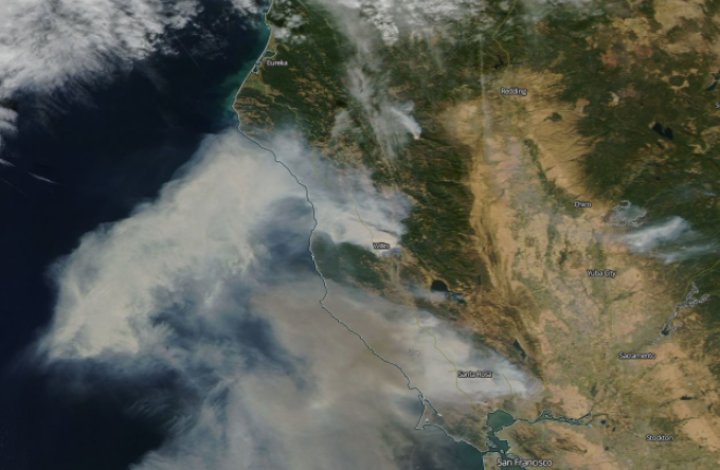
NASA satellite images of the smoke from Northern California’s deadly wildfires. Cooler air tonight is expected to let the smoke settle closer to the ground. | Image courtesy NASA.
Press release from the North Coast Air Quality Management District:
The expected onshore winds that were expected this afternoon did not materialize. Current southerly winds will continue to push smoke north into Humboldt, Del Norte and Trinity Counties. Night-time colder air will allow smoke to settle closer to the ground. The wind shift is now forecast for Wednesday morning, October 11, 2017. Similar smoke effects will continue until the shift in wind occurs.
For tonight into tomorrow morning, air quality in southern Humboldt is forecast to be “Moderate” to “Unhealthy for Sensitive Groups”, with periods of “Unhealthy.” Coastal areas of Humboldt and Trinity County are expected to be “Moderate” to “Unhealthy for Sensitive Groups” until winds begin to shift sometime on Wednesday.
Particulate Matter (PM2.5) monitors are still presently in Eureka, Scotia, Blue Lake, Smith River, Crescent City, Klamath, Orleans, Weitchpec, Hoopa, Weaverville, and Hayfork.
Fire information can be found at http://inciweb.nwcg.gov/ or at www.calfire.ca.gov. Current weather information can be found at www.wrh.noaa.gov.
Health Information for Smoke Impacts
Concentrations of smoke may vary depending upon location, weather, and distance from the fire. Smoke from wildfires and structure fires contain harmful chemicals that can affect your health. Smoke can cause eye and throat irritation, coughing, and difficulty breathing. People who are at greatest risk of experiencing symptoms due to smoke include: those with respiratory disease (such as asthma), those with heart disease, young children, and older adults.These sensitive populations should stay indoors and avoid prolonged activity. All others should limit prolonged or heavy activity and time spent outdoors. Even healthy adults can be affected by smoke. Seek medical help if you have symptoms that worsen or become severe.
If you can see, taste, or feel smoke, contact your local health department and/or primary healthcare provider. This is especially important if you have health concerns, are elderly, are pregnant, or have a child in your care.Follow these general precautions to protect your health during a smoke event:
- Minimize or stop outdoor activities, especially exercise
- Stay indoors with windows and doors closed as much as possible
- Do not run fans that bring smoky outdoor air inside – examples include swamp coolers, whole-house fans, and fresh air ventilation systems
- Run your air-conditioner only if it does not bring smoke in from the outdoors. Change the standard air conditioner filter to a medium or high efficiency filter. If available, use the “re-circulate” or “recycle” setting on the unit
- Do not smoke, fry food, or do other things that will create indoor air pollution
If you have lung disease (including asthma) or heart disease, closely monitor your health and contact your doctor if you have symptoms that worsen.
Consider leaving the area until smoke conditions improve if you have repeated coughing, shortness of breath, difficulty breathing, wheezing, chest tightness or pain, palpitations, nausea, unusual fatigue, lightheadedness.
For 24-hour Air Quality Advisory Information, call toll-free at 1-866-BURN-DAY (1-866-287-6329).
For further information, visit the District’s website at www.ncuaqmd.org
CLICK TO MANAGE